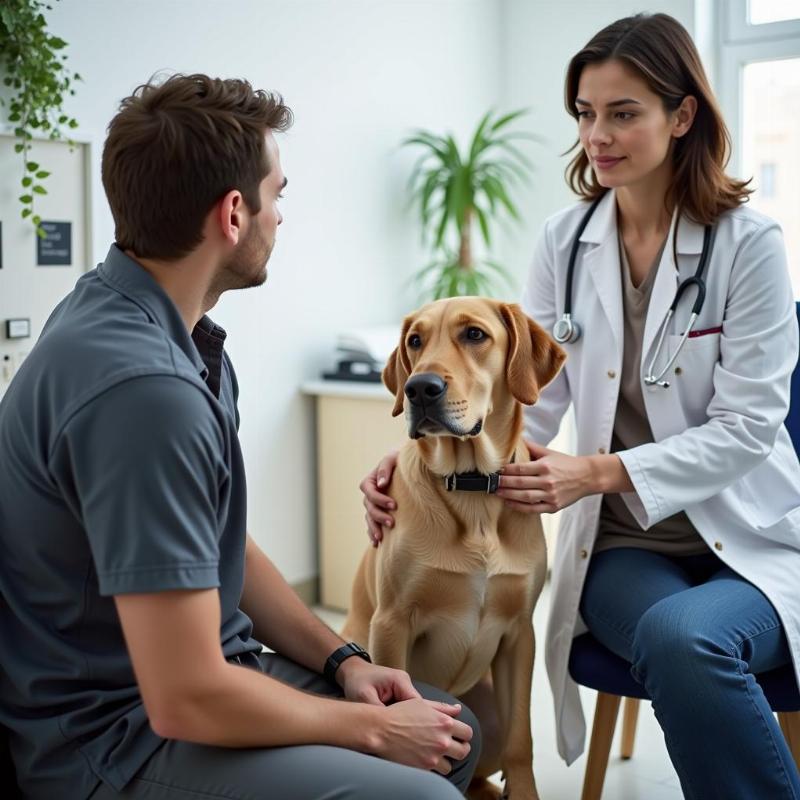The question “can a dog with a rabies vaccine get rabies?” is a crucial one for any responsible dog owner. While the rabies vaccine is highly effective, it’s not a 100% guarantee. Understanding how the vaccine works and the potential risks is essential to protecting your furry friend and yourself from this deadly disease. We’ll explore the complexities of rabies vaccination, addressing common concerns and misconceptions surrounding this vital aspect of dog health in the US.
Rabies Vaccination: How it Works and Its Effectiveness
The rabies vaccine stimulates a dog’s immune system to produce antibodies against the rabies virus. These antibodies act as a defense mechanism, neutralizing the virus if the dog is exposed. This preemptive strike is why vaccination is so critical. While extremely effective, breakthrough cases, though rare, are possible. This can occur if a dog’s immune system doesn’t respond fully to the vaccine, or if they are exposed to a particularly large viral load.
Factors like vaccine storage, administration technique, and the dog’s overall health can influence its effectiveness. In the US, rabies vaccines are licensed for use in dogs and are required by law in most states. This is due to the serious public health risk rabies poses.
Breakthrough Infections: Understanding the Risks
Though rare, a vaccinated dog can contract rabies. This is referred to as a breakthrough infection. It’s important to note that these cases are incredibly uncommon and often occur when a dog is bitten by a rabid animal and the virus enters directly into the nervous system, bypassing the circulating antibodies. Regular booster shots, as recommended by your veterinarian, are crucial to maintaining a sufficient level of protection and minimizing the risk of breakthrough infections.
What to Do if Your Vaccinated Dog is Bitten by a Potentially Rabid Animal
Even if your dog is vaccinated, any bite from a wild animal, particularly known rabies carriers like raccoons, skunks, bats, and foxes, requires immediate veterinary attention. Contact your vet immediately. They will likely recommend a booster shot to enhance your dog’s existing immunity. Quarantine protocols, as mandated by local and state regulations, may also be necessary. These measures, though sometimes inconvenient, are crucial for public safety.
 Dog owner talking to a vet
Dog owner talking to a vet
Prevention: Beyond Vaccination
Beyond vaccination, preventative measures are equally important in mitigating the risk of rabies. Avoid letting your dog roam freely, especially in areas known for wildlife activity. Supervise their interactions with other animals, particularly unfamiliar ones. Educating yourself about rabies symptoms in both animals and humans is also a critical step in responsible pet ownership.
Conclusion: Protecting Your Dog from Rabies
While the possibility of a vaccinated dog contracting rabies exists, it is exceedingly rare. Regular vaccinations and booster shots, coupled with responsible pet ownership practices, provide the best defense against this deadly disease. Always consult your veterinarian for guidance on vaccination schedules and post-exposure protocols. Your proactive approach ensures the well-being of your furry companion and the safety of your community.
FAQ
- How often should my dog receive a rabies vaccine? This depends on your local regulations and your vet’s recommendation. Typically, initial vaccination is followed by boosters every 1-3 years.
- What are the signs of rabies in a dog? Signs can vary and include behavioral changes like aggression, excessive drooling, difficulty swallowing, and paralysis.
- Can humans get rabies from a vaccinated dog? While extremely rare, it is theoretically possible if the dog experiences a breakthrough infection. Seek immediate medical attention if bitten by any animal, including a vaccinated dog.
- Are there any side effects from the rabies vaccine? Minor side effects like temporary lethargy or soreness at the injection site are possible. More serious reactions are rare but warrant veterinary attention.
- Is rabies always fatal in dogs? Once clinical signs appear, rabies is almost always fatal. This emphasizes the critical importance of preventative measures and post-exposure protocols.
- What should I do if I see a stray animal behaving strangely? Do not approach it. Contact your local animal control immediately.
- Are there home remedies for rabies? Absolutely not. Rabies is a serious viral disease requiring professional medical intervention.
Related Articles on Beautdogs.us:
- can dogs get rabies with vaccine
- vaccines needed for boarding dogs
- free vaccinations for dogs farmers branch
- dog friendly restaurants in mendocino
- how to winterize a dog door
Beautdogs.us is your premier online destination for comprehensive and reliable information on dog breeds, care, and products specifically tailored for the US market. Whether you’re a seasoned dog owner or a new pet parent, Beautdogs.us offers expert advice, insightful articles, and access to the latest trends in dog care. We provide valuable resources on everything from breed-specific needs to essential health information, ensuring your beloved companion receives the best possible care. For any inquiries or assistance, please contact us at [email protected] or call us at +1 501-555-7529.